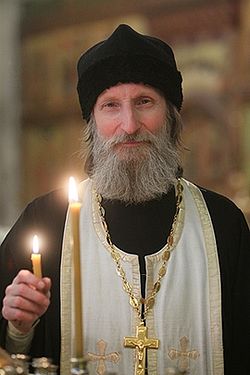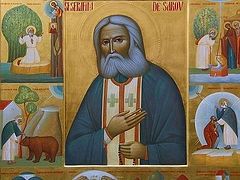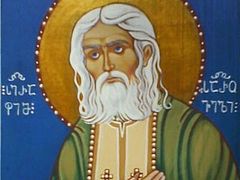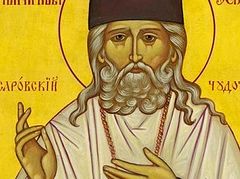The Russian Orthodox Church celebrates the uncovering of the relics of St. Seraphim of Sarov today. St. Seraphim the wonderworker greeted everyone with the exclamation, “My joy! Christ is Risen!” Next to Batiushka, hearts melted, faith in the Living God was born, and people came to repentance. Frs. Dimitry Shishkin and Nicholai Bulgakov spoke with Pravoslavie.ru on how to acquire this love and affection for all.
“If we do not have the fullness of love, let us at least do works of love”
 Fr. Dimitry Shishkin Fr. Dimitry Shishkin, rector of the Church of the Holy Protection of the Most Holy Theotokos in Poshtove, Bakhchysarai Region (Diocese of Simferopol and Crimea):
Fr. Dimitry Shishkin Fr. Dimitry Shishkin, rector of the Church of the Holy Protection of the Most Holy Theotokos in Poshtove, Bakhchysarai Region (Diocese of Simferopol and Crimea):
When we speak about a Christian’s attitude to his neighbor, we must remember that tenderness can easily turn into displays of affection and flattery. Excessive affection and “condescension” can kill a man, after all. This is especially evident in our times, when precisely this “love for mankind” justifies extreme condescension to human passions and vices. The Holy Fathers always distinguished their attitude to the man himself, no matter how he fell, from their attitude towards the dark spirits, to the passions that control this or that man.
The tender attitude of the God-pleaser St. Seraphim was his special characteristic: It sprung from the depths of his God-loving heart. And this love of God, gained through suffering as a priceless gift, allows us to truly love man precisely in recognition of his true calling. The love and tenderness of St. Seraphim envelops the entire person, contributing not only to his mental and bodily tranquility, but moreso—to his salvation in eternity. We are so lacking in such people who, comfort and inspire us to the spiritual life while at the same time not flattering our self-love and egotism. Such was St. Seraphim! His affection, extreme heartfelt warmth, and love extended, as a rule, to those whose souls were softened by repentance or are at least inclined towards it. It is precisely to repentance that true love and spiritual tenderness encourage us to a great extent. But if the saint met an arrogant and proud man, ossified in sins and unwilling to change, we see completely different examples—no small severity and even accusatory harshness. However, this harshness was, in fact, filled with love and extreme uneasiness for the eternal future of man, for his salvation.
Of course, we must have not only an externally kind and affectionate attitude towards one another, but inwardly a true and unfeigned brotherly love. The Lord Himself commanded this to us, and the Holy Apostles spoke about it repeatedly. But brotherly love is not acquired immediately. It is given by the Lord bit by bit in the same measure that we seek love and learn to acquire it. Therefore, the Lord also says: Ask, and it shall be given you (Mt. 7:7). He doesn’t say to ask once, but continually; that is, in our good desire, in our soul-profiting request, we must show perseverance and patience, extending even unto the final moment of our earthly life. This is how the spiritual life is arranged—we mustn’t stop on anything for good; nothing can be considered a closed matter. Sobriety and attention are required in all things, including in acquiring love.
But even if we don’t have this heartfelt and complete love, from which springs a truly spiritual and affectionate treatment of others, let us at least do works of love. Let us at least try to please God with good deeds done for the sake of Christ. And the Lord, seeing our need, our fervent request, our constancy in good deeds, will surely give us spiritual love for Him and others, and this is the Christian’s greatest treasure!
In this constancy, in this daily and careful execution of the commandments of Christ, in broken and attentive prayer, is found the main “recipe” from St. Seraphim for the acquisition of love.
***
“Faith gives us a good attitude towards everyone”
 Fr. Nicholai Bulgakov Fr. Nicholai Bulgakov, rector of the church of the Reigning Icon of the Mother of God in the village of Kratovo in the Moscow region:
Fr. Nicholai Bulgakov Fr. Nicholai Bulgakov, rector of the church of the Reigning Icon of the Mother of God in the village of Kratovo in the Moscow region:
“My joy!”—thus St. Seraphim of Sarov tenderly greeted everyone who came to him.
Of course, we also must have tenderness. We all love when people treat us tenderly. “Beat them all with affection and love”—this is the advice the young contemporary of St. Seraphim Nikolai Vasilievich Gogol gave his sisters.
But where should we get this tenderness from? It has to be sincere. You can’t feign affection. If you try to say “My joy!” on purpose, but your words are cold, it will be of no avail.
The main thing is not what’s on the outside, but what’s on the inside. You won’t get far on externals.
How did it look for St. Seraphim? He spoke with everyone in a sympathetic voice, although he was probably visited by people who did not speak this way with him.
After all, those coming to him were sinners! Batiushka Seraphim knew everything about them—even more than they knew about themselves. The Lord revealed it to him. Why were they a joy for him? How did they gladden him?
By being people, by the fact that they live in the world, that God created them, that He loves them, thinks about them, tolerates, forgives, cares for them: He sends them to His saint for advice, and he gives them a good thought that will be useful for them. It becomes easier, more joyful for them to live…
God is in everything! Always.
Faith gives us a good attitude towards everyone. It helps us to remember God, that the Lord loves this person. Even before you saw him, you began to turn to him in your soul. And even when you turn away from him, when you forget—the Lord does not forget and does not turn away, no matter what he has done.
“Christ is Risen, my joy!” the saint would say, reminding those who came to him of the main joy of all people, in which all our sorrows can drown, for sorrows here are always temporary, but the Paschal joy is eternal.
By His love, the Heavenly Father embraces the entire world—His creation, every person; and St. Seraphim, who continually lived with God, always felt this.
When we are with someone we love dearly, when it is reciprocated to us, when we are infinitely happy and our entire nature is overflowing with this happiness—a Divine miracle poured out upon us from Heaven—then nothing can obscure this most important, overflowing joy for us. We shine from within, and this light pours out upon all who are near: They are all friends to us, they are partakers in our happiness, we are ready to embrace everyone and to say to everyone: “And you are my joy!”
This is the happiness that was in the soul of St. Seraphim.
Only, he didn’t rejoice with our modern, unsteady, and limited joy, for we are sinners, alas, and inconstant—both ourselves and the object of our adoration. He rejoiced with a great, endless, eternal joy that touched all people—“for the universal Kingdom has been revealed,” as St. John Chrysostom proclaimed in his catechetical homily, which overflowed with this boundless joy, on the holy and light-bearing day of the most glorious and salvific Resurrection of Christ our God.
Yes, we also rejoice on this Paschal night, as this Heavenly jubilation touches our hearts. But the night passes, we break the fast, the weekdays come, and, alas, the Paschal joy dissolves in them.
But it was not so with St. Seraphim! He looked at life realistically—as it really is. After all, the Resurrection of Christ does not pass, does not disappear from our lives even after the Leavetaking of the feast of Pascha. It does not diminish in any way, no matter what the circumstances, no matter what our mood or attitude to one another, no matter what our sins! It shines with the same light as on the all-joyous Paschal night!
The holy Church reminds us about it every week. Every Sunday we celebrate a “little Pascha.” On Saturday evening, we are invited to leave all the everyday hustle and bustle, to go to church, and to again experience the most important event of all of human life. It’s not without reason that this feast penetrates the entire calendar year. The Sunday service is a tuning fork by which our soul should be adjusted for our entire life—for all of our thoughts, feelings, and actions. That is why every Orthodox person ought to be in church on Saturday evening and Sunday morning.
But even this does not always help us to live according to the Paschal joy, the Paschal truth, so that it would be the main event of our life, by which everything in it is measured, overcoming all its infirmities and all its darkness with its unfading light—as we hear on Paschal night closer to dawn, at Liturgy, when amidst the surrounding darkness our churches shine like no other time in the year, and the words of the Evangelist are heard: And the light shineth in darkness; and the darkness comprehended it not (Jn. 1:5).
“For us there is no path to despondency—Christ has conquered all…” the saint reminds us.
This is the heart of the matter—and St. Seraphim teaches it to us—that our attitude to every circumstance, to every person should not directly depend on what kind of person he is—especially since we can’t truly know this—the Lord alone knows. It should not depend on what he does—even to us personally. We can relate to everything this or that way. We can love any sinner, and we can hate any sinner. It depends on us.
We have to keep this in mind! But we, for example, condemning someone, expressing our displeasure, say in our own defense: “Well, how else am I supposed to treat him when he acts like that?”
No, we can relate to this differently. Don’t condemn, for example, but sympathize, pity, strive to help. Righteous St. Alexei Mechev, the elder of Moscow, says: “If you see someone sinning, it means you must pray for him.”
And more than that! The more he is a sinner, the worse he acts, the more you must love, help, care for, and pray for him.
This freedom of our attitude towards everyone and everything is another (or the main?) manifestation of the gift of freedom given to us by God, with which God adorned man, in the words of St. Gregory of Nyssa.
The Lord has granted us to see such “Seraphimish” love in our times in the elder Archpriest Nikolai Guryanov, who was truly of the same spirit as St. Seraphim. And just like St. Seraphim, he said: “When I die, come to me at my grave and tell me everything, as to a living person.” And people have been coming all these years—August 24 will mark seventeen years already from the day of his blessed repose.
Batiushka Nikolai had not only the gift of love from God, but as he himself had suffered so much in the godless times, and to his final days, he valued and pitied absolutely every living thing—he wouldn’t even kill a fly, but would feed them with sugar… He would say that the main thing in the spiritual life is a loving attitude towards everything all around. It’s a view on life from non-life. For anyone who has looked into the eyes of death, like St. Seraphim, life is above all Life, a great miracle of God, whatever its quality—whether it is suitable for us or not; whether it proceeds according to our desire or otherwise.
Thank God that such sufferings did not fall to our lot. But we have the opportunity to be humbled: humbled before our circumstances, before our infirmities, before others, and before everyone. Without this, we cannot sincerely relate to them well, free from ourselves, from our thoughts, from our perception of others. Put them ahead of yourself, and that, indeed, is love.
The mystery of Christianity is in humility. Humility is, of course, the most difficult thing. It is a Divine property. Learn of Me; for I am meek and humble in heart (Mt. 11:29), says the Lord.
To be “only” a slave of God, “only” a “servant of the Mother of God”—there is nothing freer than this “slavery” or higher than this service.
We come to the Church, we are catechized, we begin to keep the prayer rules, we try to fast, we read spiritual literature, we approach the Sacraments… This is all very good; but without humility—it’s not everything. Without true humility, without trust in God more than ourselves (and everything is up to the will of God anyways), we will lack the main thing.
Before he started calling those who came to him “joy” and “treasure,” St. Seraphim labored for many years in reclusion. He didn’t simply not watch television, but even when someone would walk by, he would cast his face to the ground so as not to perturb his heart.
That is, we need some serious work on ourselves—“The realignment of the soul on the foundation of the Gospel,” in the words of Archpriest Sergei Orlov (Seraphim in monasticism; 1890-1975).
“My joy, acquire a spirit of peace, and thousands around you will be saved,” the saint said.
It is to the acquisition of the Spirit of God that he calls us.
Venerable Father Seraphim, pray to God for us! Help us, teach us to acquire a spirit of peace, a spirit of love and humility, which thou hast acquired so abundantly that thou hast become a symbol of genuine Christ-like love for sinful mankind!




